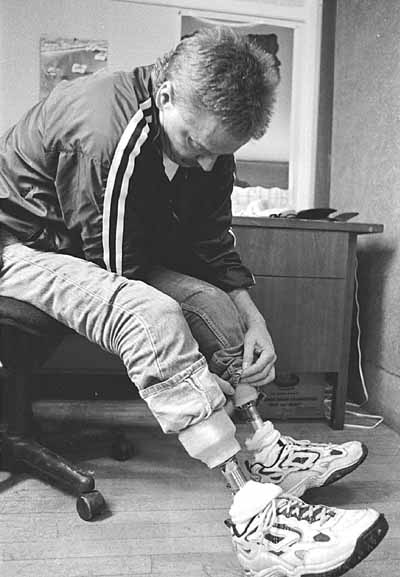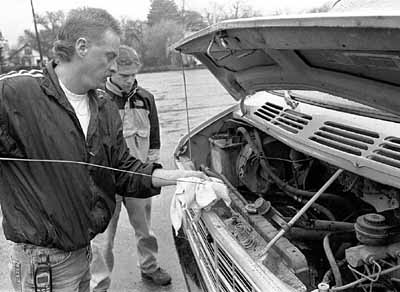Local association receives funds to help disabled
At the beginning of this year, the Bear River Association of Governments received a grant of $500,000 from the Department of Housing and Urban Development to assist 150 families with housing expenses. The federally administered funds were given to BRAG under the Mainstream Housing Opportunities for Persons with Disabilities program. So far, 50 people have applied for and received these funds – leaving 100 vouchers available to help disabled citizens by paying a portion of, or all of, their rent.
This program is in place to help people in the communities of Cache, Rich and Box Elder Counties, including some students at Utah State University. Karen Freeman, a mother of three grown children, is a student at USU and receives assistance from the housing program. She is studying social work and plans to graduate next spring.
Freeman, 56, has lived all over the country. Her parents, and later her own family, moved to where the jobs were – Pennsylvania, California, Utah, South Carolina and Michigan. After suffering a serious back injury, she returned to Utah to recover where it was not only warmer than Michigan, but also where she had the support of family members close by.
When Freeman had her accident, she was a widow working as a continuous care provider to an elderly man and living in a large home with a yard, a pool, nice furniture and many other luxuries. She said that one day as she was leaving her patient’s house she slipped on a patch of ice and caught herself. She thinks it was the lurch of catching herself that caused a disk to dislodge in her back. Not knowing exactly what happened, she visited the doctor. It took four CAT Scans before the doctors found the disk sitting on the nerves of her bladder.
“The doctor didn’t think that he could save my bladder, but there were a lot of prayers going up,” Freeman said.
She said she has always been a religious woman and leans a lot on he Lord for support and guidance in her trials. She said it was the Lord who carried her through a time that changed her life for good.
Kyle Stephens, another benefactor of the housing program, receives the maximum allowable benefit. BRAGG pays his full rent, as he fights a court battle to try and receive insurance and social security benefits after a construction accident that claimed both of his legs.
“Kyle is one of those guys that I had to practically drag in here and make him apply for the program,” said Kent Watson, executive director of the rental assistance program. “He kept saying ‘No, I think I can do OK by myself.'”
Stephens, 43, is a native of Cache Valley. He grew up in Smithfield, graduated from Skyview High School and is now the grandfather of two. He’s also moved around in the work force; after his love of traveling took him to work on a fishing boat in Alaska, he spent 15 years as a claims adjuster for Quaker State. He finally found a job he loved when he started working on road construction for a company in Bountiful. He loved the outdoors and working the big equipment.
When Stephens was working on a road near Scofield, he was operating a pneumatic roller – a large machine with multiple wheels used to flatten a road after rocks have been laid over the tar. Stephens was taking a tight corner in the road and the top-heavy machine toppled to one side.
“The engine sits on top of the chassis, it doesn’t sit within the chassis,” he said. “You just hit a little bump, and it feels like you’re going to roll right then and there, and it took me a little while to get used to that. But this time I knew it was going.”
Stephens tried to jump out of the way, but said he was caught by the arm rest and the 13.5 ton vehicle rolled over his legs.
Freeman and Stephens, like all people who receive assistance from BRGG, had to go through an application and approval process through the BRAG office located above the County Clerk’s office at 170 N. Main in Logan. Their cases were considered individually; the office looked at factors like income and extent of disability, which must be proved by receipt of social security benefits or verification from a doctor. Most people are put on a waiting list, which can take anywhere from three to six months. But in the case of the disabled vouchers, with 100 still unfilled, there is currently no waiting list.
After an apartment inspection and financial review, BRAG determines what portion of the person’s rent they will pay. Depending on need, some or all of a person’s rent – and sometimes even utilities – is paid by BRAGG directly to his or her landlord. But the cases are also subject to annual re-evaluation.
“The goal of the program is to help people become self-sufficient,” Watson said.
This is what both Stephens and Freeman are trying to do now.
“When I got home from the hospital I didn’t know what to do,” Freeman said.
She was unable to stand or even sit up longer than a few minutes and was undergoing rehabilitation. It was then that her rehab worker suggested she go back to school and experience her first meeting with social workers.
“They pushed their way into my house to do an inspection and just started going through everything,” she said. “I eventually just laid back down and let them do it. There was nothing that I could do.”
She said she felt social workers should have more compassion for the people they serve, and it was that experience that helped her to decide to study social work.
“I feel like I can really understand a lot of what people are going through because I have been through it,” she said.
When she was well enough, she started taking classes in Michigan, only able to take one class at a time because sitting for long periods of time hurt her back. Freeman eventually moved to Logan and enrolled in the program at USU. After some time, she worked up to two classes, then three, and now she is well enough to take four classes per semester. Freeman will have been in school 10 years when she graduates next spring.
After graduating, Freeman wants to work with at-risk youth, where she feels that she can make a difference and has a lot to offer.
“I always go for the underdog,” she said. “I know that they are good people and they just need someone to help them see their value.”
Stephens also has plans to return to school.
“My accident didn’t ruin my plans [for the future],” Stephens said, “It changed them. I can’t do what I love now.”
He is working for Common Ground, an Americorp VISTA outreach program housed at the Whitier Community Center. The non-profit organization provides adaptive sports equipment for people with disabilities, something right up Stephens’ alley. He is now into his fourth month of a one-year commitment working as an outreach coordinator for the organization where he is currently organizing fund raisers to help buy a much-needed bus. He receives a small monthly stipend, but when the year is completed he will receive a $4,750 educational award to put toward paying tuition when he goes back to school. Stephens plans to study computer science or business administration.
Both Freeman and Stephens show a lot of gratitude to the people helping them and have a strong determination to give back to society when they are able.
While Stephens talks about one day giving back to BRAGG, Freeman wants to help society through her work as a social worker.
“My goal is to help somebody else,” she said. “You never know when it will happen to you, and if it does how would you like to be treated?”
Freeman said aside from a few material needs, she isn’t missing anything. Downsizing her life from the large home she had before her accident was difficult, but “I’m happier now,” she said. “All I did was clean that house.”
And she has gained a lot through her life experiences.
“I don’t think that I was as sympathetic before I got hurt,” she said.
She said she used to
look critically on people who were using food stamps in the store, but now she is the one using the food stamps and that has helped her put things into perspective.
“We try to reward people who are trying to improve their situation, who are working or going to school,” Watson said.
Each rental assistance case is subject to an annual review. The person’s apartment is inspected again, his income is re-considered and his situation as a whole is updated. When it is determined that a person may now live without the assistance, he’s taken off of the program, but his assistance is held for six months in case something happens, Watson said.
BRAG is an association between Cache, Rich and Box Elder counties. They pool resources to provide programs and support in the smaller communities of Northern Utah that would otherwise not have access to those programs. The association has funds to assist nearly 400 low-income and disabled families, with the 150 Mainstream Vouchers going specifically to aid disabled individuals. Total resources are worth $1.5 million.
Freeman and Stephens are two of hundreds of people BRAGG is currently helping, but the organization can do more. Watson said one of their big concerns is pushing the Mainstream Vouchers.
“I know the need is out there,” he said. “It’s free money, we just need to find the people to give it to.”

Kyle Stephens attaches prosthetics to begin his day. He still undergoes periodic surgeries. (By Joe Rowleys)

